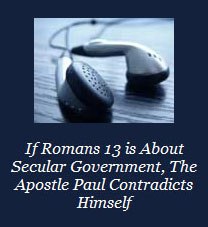|
What Says the Bible?
I say the truth in Christ, I lie not, my conscience also bearing me witness in the Holy Ghost, that I have great heaviness and continual sorrow in my heart. For I could wish that myself were accursed from Christ for my brethren, my kinsmen according to the flesh: Who are Israelites; to whom pertains the adoption, and the glory, and the covenants, and the giving of the law, and the service of God, and the promises; Whose are the fathers, and of whom as concerning the flesh Christ came, who is over all, God blessed forever. Amen. (Romans 9:1-5) 1
It’s not open to debate to whom the Apostle Paul wrote this. It has nothing to do with an alleged found-no-where-in-the Bible spiritual Israel,2 comprised of people saved by Jesus Christ3 from any and all nationalities. It couldn’t be any clearer that Paul wrote those five versus to his “kinsmen according to the flesh who are Israelites.”
Paul’s physical Israelite kinsmen are those to whom belongs 1) the adoption, 2) the glory, 3) the covenants, 4) the giving of the law, 5) the service, 6) the promises, 7) the fathers, and 8) to whom Christ came. In other words, among other things, those eight particulars are exclusive to Israelites.
That may not agree with what you’ve previously been taught. But, frankly, what you or I have been taught, or believe, doesn’t matter if what we believe doesn’t agree with God’s Word. When it’s discovered that any of our beliefs are contrary to Word of God, those beliefs—just like Paul’s pharisaical beliefs—should become dung to us, per Philippians 3:4-8.
The Great “Gentile” Delusion
Before addressing more Israelite exclusivity, there’s an objection that needs to be answered first. Someone is likely to protest: “Yeah, but what about the non-Israelite Gentiles4 grafted into the olive tree in Romans 11?”
Indeed! What about those alleged non-Israelite Gentiles in Romans 11 and throughout the New Testament? What if it can be scripturally proven that the word “Gentiles” doesn’t belong in our Bibles? That it’s a horrible translation? That even the capitalization is incorrect? And that, therefore, there are no such people as non-Israelite Gentiles—non-Israelites of course, but not non-Israelite Gentiles.
Both the Hebrew word goyim and its Greek counterpart ethne—often tragically translated “Gentiles”—do not mean non-Israelites, as many people have been disastrously led to believe whenever they come across the English word “Gentiles” in their Bibles. This has spawned numerous other false conclusions regarding the Scriptures, including what some people believe Paul is describing in Romans 11 and, in turn, their rejection of Romans 9:1-5 and other New Testament passages regarding Israelites.
The Hebrew goyim and the Greek ethne do not mean non-Israelite Gentiles but rather nations. Sometimes non-Israelite nations and sometimes Israelite nations, as any Hebrew and/or Greek lexicon will demonstrate.5
In other words, goyim and ethne are not the exclusionary terms that many people have attempted to make them. Goyim and ethne mean nations, requiring us, in turn, to let the context determine what nations the author has in mind.
If, in any instance, goyim or ethne can be translated “Gentiles,” then they should likewise be translated “Gentiles” (allegedly meaning non-Israelites) everywhere goyim and ethne are found in the Old and New Testaments.
Whereas such consistency can be achieved with the English word “nations,” try it with “Gentiles” and see how well it works.
For example, try replacing the word “nations,” correctly translated from goyim, with the term “non-Israelites” in Genesis 25:23 where Rebekah was informed about her twin boys Jacob (whose name was later changed to Israel) and Esau:
And Yahweh 6 said unto her, Two non-Israelites are in thy womb, and two manner of people shall be separated from thy bowels; and the one people shall be stronger than the other people; and the elder shall serve the younger. (Genesis 25:23)
Neither Gentiles, nor non-Israelites, can be made to work in this passage. So, of course, the translators rendered goyim correctly as “two nations”—Jacob and Esau being the progenitors of two nations, one Israelite and one non-Israelite.
Try doing the same in Genesis 48:19 where Jacob/Israel blesses Joseph’s second son Ephraim:
[H]is father refused, and said, I know it, my son, I know it: he [Manasseh] also shall become a people, and he also shall be great: but truly his younger brother [Ephraim] shall be greater than he, and his seed shall become a multitude of non-Israelites. (Genesis 48:19)
That doesn’t work! Ephraim was an Israelite and the progenitor of Ephraimite Israelites.
Try replacing the word “nations” with non-Israelites in Jeremiah 31:35-36 where God promised the Israelites He would never forsake them:
Thus saith Yahweh, which giveth the sun for a light by day, and the ordinances of the moon and of the stars for a light by night, which divideth the sea when the waves thereof roar; Yahweh of hosts is his name: If those ordinances depart from before me, saith Yahweh, then the seed of Israel also shall cease from being non-Israelites before me for ever. (Jeremiah 31:35-36)
That, of course, is absurd.
Those three passages and a host of others demonstrate that the definition and application of the Hebrew goyim is not as narrow as some people would have it, and that goyim should have never been translated “Gentiles.”
The same is true for its Greek counterpart ethne. If it’s correct to translate ethne as “Gentiles” in one location, then it’s correct to translate it “Gentiles” in all instances in the New Testament. Thus, for example, John 18:35 where Pilate identifies Christ’s conspirators:
Pilate answered, Am I a Jew [Judahite]? Thine own [non-Israelite] Gentiles and the chief priests have delivered thee unto me: what hast thou done? (John 18:35)
Once again, that doesn’t work because it was Jesus’ own nation—Judahite Israelites, not non-Israelites—who delivered Him to Pilate. Thus, in this instance, the translators correctly translated ethnos (singular of ethne) as “nation.”7
Two Israelite Olive Branches
Back to the previous objection—that is, that the Israelite exclusivity depicted in Romans 9:1-5 cannot be true because allegedly non-Israelite Gentiles were grafted into the Olive Tree in Romans 11. To begin with, to take this position is to pit Romans 11 against Romans 9. Pitting scripture against scripture never results in truth. At best, it results in half-truths, which, in turn, contributes to erroneous theology. Pitting scripture against scripture is one of, if not, the most predominate causes of false doctrine.
If the word “Gentiles,” translated from ethne, is removed and replaced with “nations” in Romans 11, the context must then determine what nations are in play in this instance. For the context, we need to go back to Romans 9:
Hath not the potter power over the clay, of the same lump to make one vessel unto honour, and another unto dishonour? What if God, willing to shew his wrath, and to make his power known, endured with much longsuffering the vessels of wrath fitted to destruction: And that he might make known the riches of his glory on the vessels of mercy, which he had afore prepared unto glory, Even us, whom he hath called, not of the Jews [Judahites] only, but also of the Gentiles? (Romans 9:21-24)
Not Gentiles, but nations. What nations? It’s not for you and me to arbitrarily decide that. Only the Apostle Paul can determine what nations he has in mind. By what Paul wrote next, it’s crystal clear what nations he’s referring to:
What if God, willing to shew his wrath, and to make his power known, endured with much longsuffering the vessels of wrath fitted to destruction: And that he might make known the riches of his glory on the vessels of mercy, which he had afore prepared unto glory, Even us, whom he hath called, not of the Jews [Judahites] only, but also of the nations? As he saith also in Hosea, I will call them my people, which were not my people; and her beloved, which was not beloved. And it shall come to pass, that in the place where it was said unto them, Ye are not my people; there shall they be called the children of the living God. (Romans 9:22-26)
Paul informs us how to determine what nations he’s referring to in his statement, “as he says also in Hosea,” from which he quotes Hosea 1:10 and 2:23. Read those two chapters for yourself and you’ll find there’s nothing in those chapters—or, for that matter, in the entire book of Hosea—regarding non-Israelites. Instead, you’ll find Yahweh’s Old Covenant divorce of the ten-tribed house of Israel and Hosea’s prophecy regarding Yahweh’s New Covenant remarriage to them, along with their New Covenant reunion with the two-tribed house of Judah, aka Judahites.
Although almost universally interpreted as non-Israelites because of the spurious translation “Gentiles,” Romans 9:24 is instead about the ethne, that is, the nations of the house of Israel. This contextual truth carries over to Paul’s discussion of the two olive branches in Romans 11. The wild branch represents the house of Israel, the first to turn wild and adulterate herself with other gods, and who, in turn, had been divorced by Yahweh:
And I saw, when for all the causes whereby backsliding Israel committed adultery I had put her away, and given her a bill of divorce; yet her treacherous sister Judah feared not, but went and played the harlot also. (Jeremiah 3:8)
The other branch, the cultivated branch in Romans 11, represents the house of Judah with whom God retained His marital relationship, at least until they rejected and crucified His Son.
Both “olive branches” and “olive trees” in the Bible are Israelite-exclusive terms. Every time you find either term identified with a people, it’s always Israelites whom they depict. For example:
They are turned back to the iniquities of their forefathers, which refused to hear my words; and they went after other gods to serve them: the house of Israel and the house of Judah have broken my covenant which I made with their fathers…. Yahweh called thy name, a green olive tree, fair, and of goodly fruit: with the noise of a great tumult he hath kindled fire upon it, and the branches of it are broken. For Yahweh of hosts, that planted thee, hath pronounced evil against thee, for the evil of the house of Israel and of the house of Judah…. (Jeremiah 11:10, 16-17)
Initially, the two olive branches (both houses when united under King David) were good. But eventually, they both bore bad fruit and had to be broken off from their tree. In Romans 11, the olive tree is described as good and one of its branches (the house of Israel) is depicted as bad and having been broken off. The other branch (the house of Judah) on the verge of also being broken off. This contextual interpretation is, in turn, the perfect fulfillment of Jeremiah’s prophecy, as well as Isaiah’s:
Now will I sing to my wellbeloved a song of my beloved touching his vineyard. My wellbeloved hath a vineyard in a very fruitful hill: And he fenced it, and gathered out the stones thereof, and planted it with the choicest vine, and built a tower in the midst of it, and also made a winepress therein: and he looked that it should bring forth grapes, and it brought forth wild grapes. And now, O inhabitants of Jerusalem, and men of [the house of] Judah, judge, I pray you, betwixt me and my vineyard. What could have been done more to my vineyard, that I have not done in it? wherefore, when I looked that it should bring forth grapes, brought it forth wild grapes? And now go to; I will tell you what I will do to my vineyard: I will take away the hedge thereof, and it shall be eaten up; and break down the wall thereof, and it shall be trodden down: And I will lay it waste: it shall not be pruned, nor digged; but there shall come up briers and thorns: I will also command the clouds that they rain no rain upon it. For the vineyard of Yahweh of hosts is the house of Israel, and the men of Judah his pleasant plant…. (Isaiah 5:1-7)
Isaiah’s depiction of Yahweh’s judgment upon the house of Israel is equivalent to these Israelites being broken off from His olive tree. In turn, this is also equivalent to Yahweh’s divorce of the Old Covenant house of Israel—the first of the two houses to be divorced.
Not Union, but Reunion
Romans 11 is not referring to a union between Israelites and non-Israelites, as usually interpreted. Instead, once the word “Gentiles” is removed and replaced with “nations,” it’s easily seen from the Old Testament prophesies fulfilled therein and from its context that Roman 11’s two olive branches reunited with each other is the reunion of the ten-tribed house of Israel with the two-tribed house of Judah, prophesied several times in the Old Testament.
Additionally, when interpreted correctly, Roman 11’s two olive branches is the thrilling fulfillment of Ezekiel 37’s two-stick prophecy regarding the reunion of the house of Judah with the house of Israel:
The word of Yahweh came again unto me, saying, Moreover, thou son of man, take thee one stick, and write upon it, For Judah [the principle tribe of the house of Judah], and for the children of Israel his companions: then take another stick, and write upon it, For Joseph, the stick of Ephraim [the principle tribe of the house of Israel] and for all the house of Israel his companions: And join them one to another into one stick; and they shall become one in thine hand….Thus saith the Lord Yahweh; Behold, I will take the stick of Joseph, which is in the hand of Ephraim, and the tribes of Israel his fellows, and will put them with him, even with the stick of Judah, and make them one stick, and they shall be one in mine hand…. And say unto them, Thus saith the Lord Yahweh; Behold, I will take the children of Israel from among the heathen [non-Israelite nations], whither they be gone, and will gather them on every side, and bring them into their own land: And I will make them one nation in the land upon the mountains of Israel; and one king shall be king to them all: and they shall be no more two nations, neither shall they be divided into two kingdoms any more at all … so shall they be my people, and I will be their God. And [the greater] David [Jesus] my servant shall be king over them; and they all shall have one shepherd: they shall also walk in my judgments, and observe my statutes, and do them. (Ezekiel 27:15-24)
Consequently, Romans 11 has nothing to do with non-Israelites. It’s describing the prophesied reunion of the house of Israel with the house of Judah—that is, a redeemed remnant thereof. It’s this redeemed New Covenant remnant that Paul depicts in Romans 11:26 as “all Israel”—a redeemed remnant from all Israel, that is, from both the house of Judah and the house of Israel.
Moreover, this is the only interpretation that harmonizes the remnant of Israel being saved in Romans 9:26 & 11:5 and all Israel being saved in Romans 11:26—a remnant from all Israel.
Consequently, not only does Romans 11 not disprove the Israelite exclusivity in Romans 9:1-5, it’s a contextual extension to the same.8
Part 1 of a three-part audio series by the same title can be found at https://missiontoisrael.org/tapelist.html#T1343
Click here for Part 2
End Notes
1. All scripture is quoted from the King James Version unless otherwise noted.
2. See free online book Spiritual Israel: Out of All Nations or Out of National Israel at https://missiontoisrael.org/Spirit13.php.
3. Yeshua is the English transliteration of our Savior’s given Hebrew name, with which He introduced Himself to the Apostle Paul in Acts 26:14-15. (Jesus is a twice-removed transliteration: the English transliteration of the Greek Iesous, which is the Greek transliteration of the Hebrew Yeshua.) Because many people are unfamiliar or uncomfortable with Yeshua, I have chosen to use the more familiar name Jesus in this article in order to remove what might otherwise be a stumbling block.
4. For a more exhaustive treatise regarding the alleged “Gentiles,” see free online book The Mystery of the Gentiles: Who Are They and Where Are They Now? at https://missiontoisrael.org/mystery-of-gentiles/index.php.
5. See Chapter 5 of The Mystery of the Gentiles: Who Are They and Where Are They Now? at https://missiontoisrael.org/mystery-of-gentiles/index.php.
6. YHWH, the English transliteration of the Tetragrammaton, is most often pronounced Yahweh. It is the principal Hebrew name of the God of the Bible and was inspired to appear nearly 7,000 times in the Old Testament. It was unlawfully deleted by the English translators. In obedience to the Third Commandment and scriptures that charge us to proclaim, swear by, praise, extol, call upon, bless, glorify, and hold fast to His name, I have chosen to memorialize His name, per Exodus 3:15, in this article.
For a more thorough explanation concerning important reasons for using the sacred name of God, see Thou shalt not take the name of YHWH thy God in vain, the third in a series of ten free online books on each of the Ten Commandments and their respective statutes and civil judgments.
7. For a more exhaustive treatise regarding the alleged “Gentiles,” see free online book The Mystery of the Gentiles: Who Are They and Where Are They Now? at https://missiontoisrael.org/mystery-of-gentiles/index.php.
8. For a more exhaustive treatise of Romans 11, see Chapter 7 of The Mystery of the Gentiles: Who Are They and Where Are They Now? at https://missiontoisrael.org/mystery-of-gentiles/index.php.
Click here for Part 2 |
|







